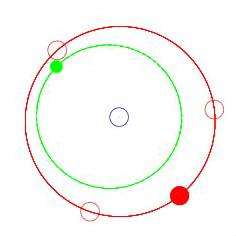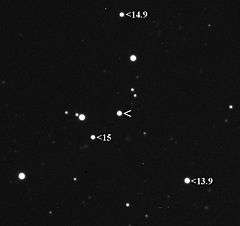153 Hilda
|
Star field showing Hilda (apmag 14.2) | |
| Discovery[1] | |
|---|---|
| Discovered by | J. Palisa |
| Discovery date | 1875 |
| Designations | |
| Main belt (Hilda) | |
| Orbital characteristics[1] | |
| Aphelion | 4.533 AU |
| Perihelion | 3.412 AU |
| 3.973 AU | |
| Eccentricity | 0.141 |
| 7.92 years | |
| Inclination | 7.83° |
| Physical characteristics | |
| Dimensions | 171 ± ?? km[1] |
| Mass | ~5.2×1018 kg |
Equatorial escape velocity | ~ 6 m/s |
| 5.11 hours[1] | |
| 0.062[1] | |
| C | |
| 7.48[1] | |
|
| |

153 Hilda is a large asteroid in the outer main belt, with a diameter of 170 km.[1] Because it is composed of primitive carbonaceous materials, it has a very dark surface. It was discovered by Johann Palisa on November 2, 1875, from the Austrian Naval Observatory at Pula.[1] The name was chosen by the astronomer Theodor von Oppolzer, who named it after one of his daughters.[2]
Orbit and family
Hilda gives its name to an asteroid group called the Hilda family (or Hildas for short). It is not a true asteroid family, since the members are not physically related, but rather share similar orbital elements. The Hildas are locked in a 2:3 orbital resonance with Jupiter;[3] since Jupiter takes 11.9 years to orbit the Sun while Hilda takes 7.9 years,[1] Jupiter orbits the Sun twice for every 3 orbits that Hilda completes. There are over 1,100 other objects known to be in a 2:3 resonance with Jupiter.[3]
Observations
Hilda was observed to occult a star on December 31, 2002, from Japan. It has a very low-amplitude light curve indicating a spherical body or a non-varying albedo.
Notes
- ↑ Based on orbital data from the year 2000. Hilda seldom approaches the Lagrangians exactly.
References
- 1 2 3 4 5 6 7 8 9 "JPL Small-Body Database Browser: 153 Hilda". 1998-02-12. Retrieved 2009-12-15.
- ↑ Lutz D. Schmadel, Dictionary of Minor Planet Names, p.29.
- 1 2 Brož, M.; Vokrouhlický, D. (2008). "Asteroid families in the first-order resonances with Jupiter". Monthly Notices of the Royal Astronomical Society 390 (2): 715–732. Bibcode:2008MNRAS.tmp.1068B. doi:10.1111/j.1365-2966.2008.13764.x.
External links
- Orbital simulation from JPL (Java) / Horizons Ephemeris
- The triangle formed by the Hilda asteroids EasySky
- 153 Hilda at the JPL Small-Body Database
| ||||||
| ||||||||||||||||||||||||||||
